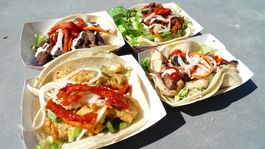Korean taco
Lua error in package.lua at line 80: module 'strict' not found.
Korean tacos are a Korean-Mexican fusion dish popular in a number of urban areas in the United States. Korean tacos originated in Los Angeles,[1] often as street food, consisting of Korean-style fillings, such as bulgogi and kimchi, placed on top of small traditional Mexican corn tortillas. Korean burritos are a similarly themed dish, using larger flour tortillas as a wrap.
Background
Although nearly any savory dish can and has been used as filling for a taco, burrito, or wrap, and other restaurants have occasionally served dishes they called Korean tacos,[2] the popularity of the dish is generally traced to the use of Twitter by the proprietors of the Kogi Korean BBQ, a food truck in Los Angeles, California, to announce their schedule and itinerary.[3][4][5] The idea of making Korean tacos came to owner Mark Manguera after an unsuccessful search of Los Angeles' Koreatown for carne asada tacos.[4] In its first year of operation, Kogi generated an estimated $2 million of revenue.[6]
Korean taco trucks later appeared in Portland, Oregon (the "KOI Fusion" truck), Austin, Texas (the Chi'Lantro BBQ truck)[1], and Seattle, Washington ("Marination Mobile", whose spicy pork Korean taco earned them Good Morning America's Best Food Truck in America).[7] In San Francisco the dish was popularized in 2009 by Namu Restaurant's Happy Belly food cart in Golden Gate Park, later moving to a farmers market food stand at the San Francisco Ferry Building.[8] The dish's popularity lead mainstream fast food chain Baja Fresh to test market Korean tacos as a menu item in California, with plans to introduce the dish to hundreds of locations nationwide.[9][10]
By 2010, restaurants and food trucks serving Korean tacos had appeared across the country including Austin, Chicago, St. Louis, and the East Coast of the United States.[11]
In April 2010, Food & Wine magazine named Roy Choi, the chef of the original Kogi's, one of its annual "Best New Chefs".[12] It was the first time a food truck chef had been nominated for the award.[13]
See also
- Korean-style carrot - a similar dish popular in post-Soviet states.
- Burrito
- Korean-Mexican fusion
- Popiah
- Ssam
References
- ↑ Lua error in package.lua at line 80: module 'strict' not found.
- ↑ A restaurant in Santa Monica, California called "2424 Pico", for example, began using the name as early as 1996 for Korean fillings inside of a lettuce wrap. Lua error in package.lua at line 80: module 'strict' not found.
- ↑ Lua error in package.lua at line 80: module 'strict' not found.
- ↑ 4.0 4.1 Lua error in package.lua at line 80: module 'strict' not found.
- ↑ Lua error in package.lua at line 80: module 'strict' not found.
- ↑ Lua error in package.lua at line 80: module 'strict' not found.
- ↑ Lua error in package.lua at line 80: module 'strict' not found.
- ↑ Lua error in package.lua at line 80: module 'strict' not found.
- ↑ Lua error in package.lua at line 80: module 'strict' not found.
- ↑ Lua error in package.lua at line 80: module 'strict' not found.
- ↑ Lua error in package.lua at line 80: module 'strict' not found.
- ↑ Lua error in package.lua at line 80: module 'strict' not found.
- ↑ Lua error in package.lua at line 80: module 'strict' not found.
